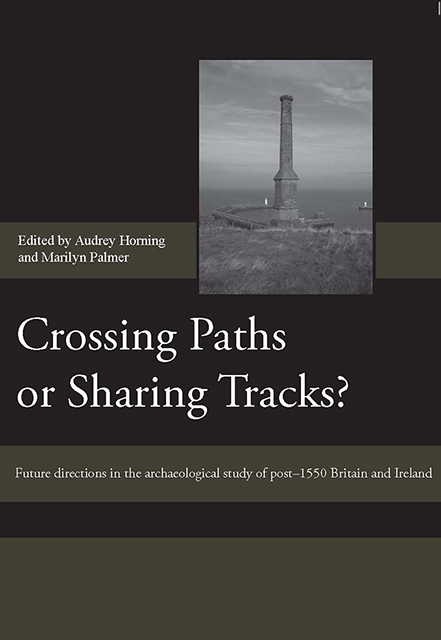 Crossing Paths or Sharing Tracks?
Crossing Paths or Sharing Tracks? General Introduction
Published online by Cambridge University Press: 07 March 2023
Summary
The chapters in this volume represent revised versions of papers presented at the April 2008 conference entitled Crossing Paths or Sharing Tracks? Future Directions in the Study of Post-1550 Britain and Ireland held at the University of Leicester. The idea for the conference was sparked by a series of conversations between the Editors reflecting on the proliferation of organisations catering to people interested in studying aspects of the archaeology of the last five hundred or so years. Our concern in these conversations was that the discipline was fragmenting, and that people who should be working together and learning from one another were eschewing those conversations in favour of gathering together withmore ‘like-minded’ individuals. We were disturbed by seemingly harmful characterisations, such as the view that ‘post-medieval archaeology’ meant ‘old-fashioned’ artefact research whereas ‘historical archaeology’ meant theory-driven archaeology. The emergence of the Contemporary Historical Archaeology and Theory conference in 2003 seemed to support the notion that theory was indeed outside the remit of the Society for Post-Medieval Archaeology (SPMA), a perception of considerable concern to the Society, which had been working in earnest to broaden its base and its appeal.
Trouble was also brewing within the Association for Industrial Archaeology (AIA), as the 2005 publication of two volumes promoting the incorporation of social approaches to industrial sites sparked a fierce debate between proponents of ‘technocentric’ versus ‘sociocentric’ approaches, as discussed in depthin several papers in this volume. Perennial debates over ‘when’ post-medieval archaeology ‘begins’ and ‘ends’, and when industrial archaeology ‘takes over’ flared up again. In our view, such wrestling over ownership was hardly likely to further the discipline as a whole. Meanwhile, a series of conversations (held primarily in a number of Belfast pubs) led to the 1999 emergence of a new organisation focused upon promoting the study of the archaeology of post-1550 Ireland, the Irish Post-Medieval Archaeology Group (IPMAG). No sooner had the ink begun to dry on the Group's constitution than rumblings of discontent were heard elsewhere on the island. Why had IPMAG chosen the term ‘post-medieval’ rather than ‘historical’? Didn't the ‘colonial’ history of Ireland make the approach of North American historical archaeology far more appropriate? And wasn't ‘post-medieval’ a synonym for atheoretical anyway?
Of further concern to us was recognition of some serious schisms between professional sectors (academic, commercial and government) and between professional and amateur.
- Type
- Chapter
- Information
- Crossing Paths or Sharing Tracks?Future directions in the Archaeological Study of Post-1550 Britain and Ireland, pp. xiii - xivPublisher: Boydell & BrewerPrint publication year: 2009
